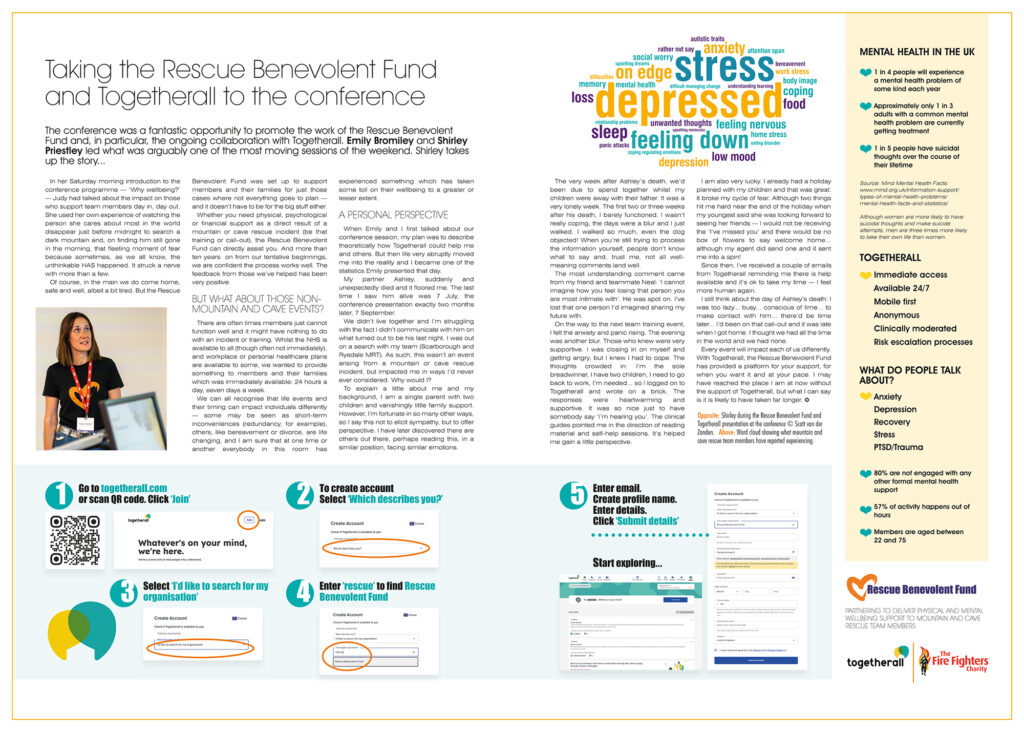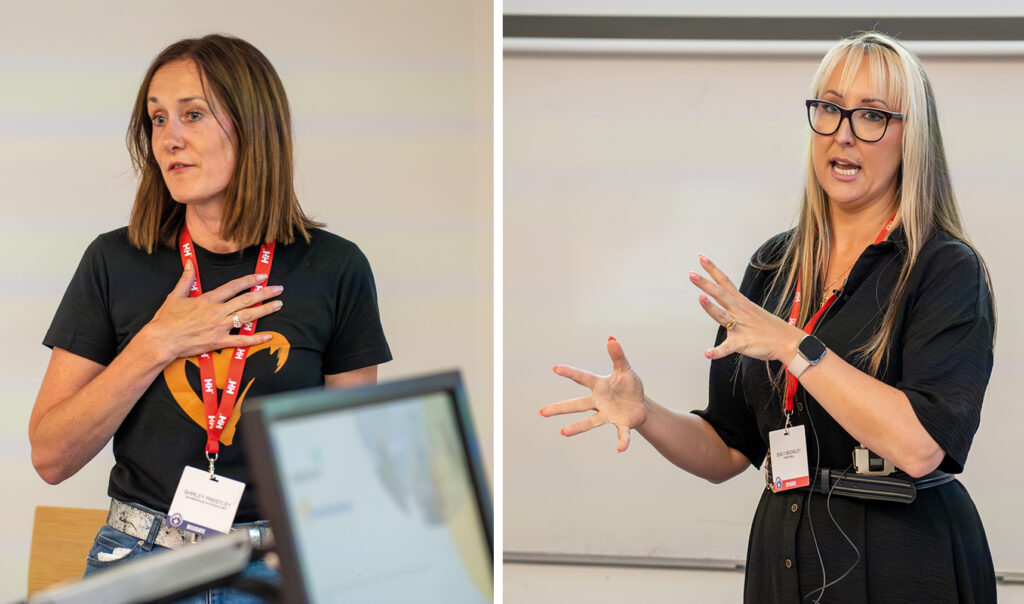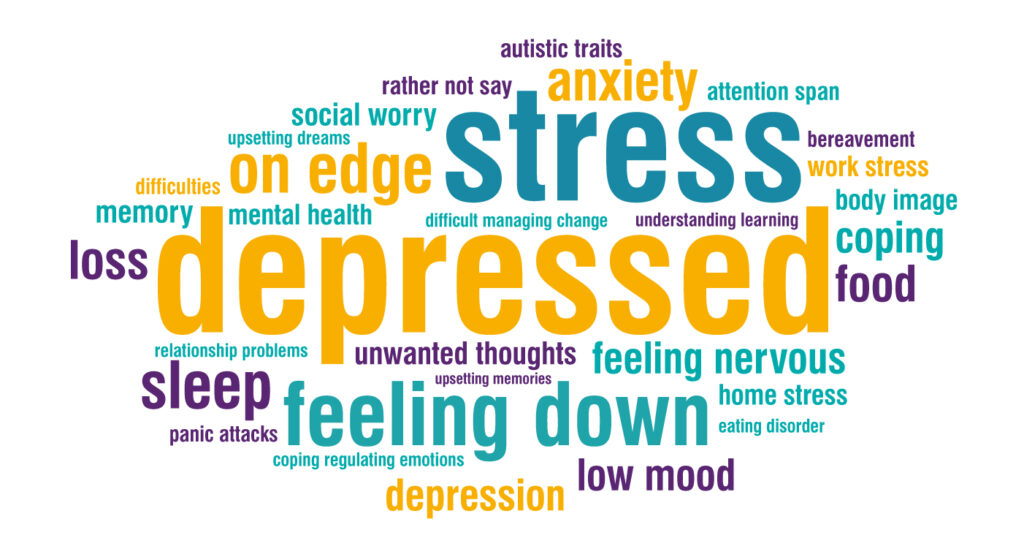How Togetherall is supporting team members
One of our very own trustees talks about how our collaboration with the online mental health resource Togetherall has helped her through a difficult time.
From the archive: Mountain Rescue Magazine Issue 90, Autumn 2024.

This year’s biennial MREW Conference, at Lancaster University, was a fantastic opportunity to promote the work of the Rescue Benevolent Fund and, in particular, the ongoing collaboration with Togetherall. Emily Bromiley (from Togetherall) and Shirley Priestley (a mountain rescue team member and one of our fund trustees) led what was arguably one of the most moving sessions of the weekend. Shirley takes up the story…
In her Saturday morning introduction to the conference programme — ‘Why wellbeing?’ — Judy (another of our fund trustees and editor of Mountain Rescue magazine) had talked about the impact on those who support team members day in, day out. Judy also happens to be married to an operational team member in the Lake District. She used her own experience of watching the ‘person she cares about most in the world’ disappear just before midnight to search a dark mountain and, on finding him still gone in the morning, that fleeting moment of fear because sometimes, as we all know, the unthinkable HAS happened. It struck a nerve with more than a few in the audience.
Of course, in the main we do come home, safe and well, albeit a bit tired. But the Rescue Benevolent Fund was set up to support members and their families for just those cases where not everything goes to plan — and it doesn’t have to be for the big stuff either.
Whether you need physical, psychological or financial support as a direct result of a mountain or cave rescue incident (be that training or call-out), the Rescue Benevolent Fund can directly assist you. And more than ten years on from our tentative beginnings, we are confident the process works well. The feedback from those we’ve helped has been very positive.
But what about those non-mountain and cave events?
There are often times members just cannot function well, and it might have nothing to do with an incident or training. Whilst the NHS is available to all (though often not immediately), and workplace or personal healthcare plans are available to some, we wanted to provide something to members and their families which was immediately available: 24 hours a day, seven days a week.
We can all recognise that life events and their timing can impact individuals differently — some may be seen as short-term inconveniences (redundancy, for example). Others, like bereavement or divorce, are life changing, and I am sure that at one time or another everybody in that conference session — and in the wider world of mountain and cave rescue — has experienced something which has taken some toll on their wellbeing to a greater or lesser extent.

A personal perspective
When Emily and I first talked about our session, my plan was to describe theoretically how Togetherall could help me and others. But then life very abruptly moved me into the reality and I became one of the statistics Emily presented that day.
My partner Ashley, suddenly and unexpectedly died and it floored me. The last time I saw him alive was 7 July, the conference presentation exactly two months later, 7 September.
We didn’t live together and I’m struggling with the fact I didn’t communicate with him on what turned out to be his last night. I was out on a search with my team (Scarborough and Ryedale MRT). As such, this wasn’t an event arising from a mountain or cave rescue incident, but impacted me in ways I’d never ever considered. Why would I?
To explain a little about me and my background, I am a single parent with two children and vanishingly little family support. However, I’m fortunate in so many other ways, so I say this not to elicit sympathy, but to offer perspective. I have since discovered there are others out there, perhaps reading this, in a similar position, facing similar emotions.
The very week after Ashley’s death, we’d been due to spend together whilst my children were away with their father. It was a very lonely week. The first two or three weeks after his death, I barely functioned. I wasn’t really coping, the days were a blur and I just walked. I walked so much, even the dog objected! When you’re still trying to process the information yourself, people don’t know what to say and, trust me, not all well-meaning comments land well.
The most understanding comment came from my friend and teammate Neal: ‘I cannot imagine how you feel losing that person you are most intimate with’. He was spot on. I’ve lost that one person I’d imagined sharing my future with.
On the way to the next team training event, I felt the anxiety and panic rising. The evening was another blur. Those who knew were very supportive. I was closing in on myself and getting angry, but I knew I had to cope. The thoughts crowded in: I’m the sole breadwinner, I have two children, I need to go back to work, I’m needed… so I logged on to Togetherall and wrote on a brick. The responses were heartwarming and supportive. It was so nice just to have somebody say ‘I’m hearing you’. The clinical guides pointed me in the direction of reading material and self-help sessions. It’s helped me gain a little perspective.
I am also very lucky. I already had a holiday planned with my children and that was great. It broke my cycle of fear. Although two things hit me hard near the end of the holiday when my youngest said she was looking forward to seeing her friends — I would not be receiving the ‘I’ve missed you’ and there would be no box of flowers to say welcome home… although my agent did send one and it sent me into a spin!
Since then, I’ve received a couple of emails from Togetherall reminding me there is help available and it’s ok to take my time — I feel more human again.
I still think about the day of Ashley’s death: I was too lazy… busy… conscious of time… to make contact with him… there’d be time later… I’d been on that call-out and it was late when I got home. I thought we had all the time in the world and we had none.
Every event will impact each of us differently. With Togetherall, the Rescue Benevolent Fund has provided a platform for your support, for when you want it and at your pace. I may have reached the place I am at now without the support of Togetherall, but what I can say is it is likely to have taken far longer.

A few stats about Mental Health in the UK:
- 1 in 4 people will experience a mental health problem of some kind each year
- Approximately only 1 in 3 adults with a common mental health problem are currently getting treatment
- 1 in 5 people have suicidal thoughts over the course of their lifetime.
Source: Mind Mental Health Facts: www.mind.org.uk/information-support/ types-of-mental-health-problems/mental-health-facts-and-statistics/ Although women are more likely to have suicidal thoughts and make suicide attempts, men are three times more likely to take their own life than women.
What can Togetherall provide?
- Immediate access
- Available 24/7
- Mobile first
- Anonymous
- Clinically moderated
- Risk escalation processes
What do people most talk about?
- Anxiety
- Depression
- Recovery
- Stress
- PTSD/Trauma
If you need help, registering with Togetherall is easy: just follow the instructions below…
